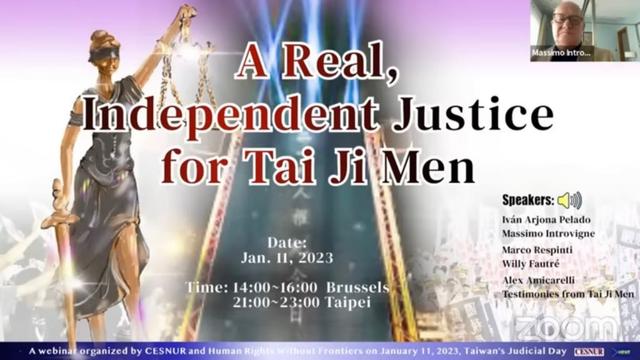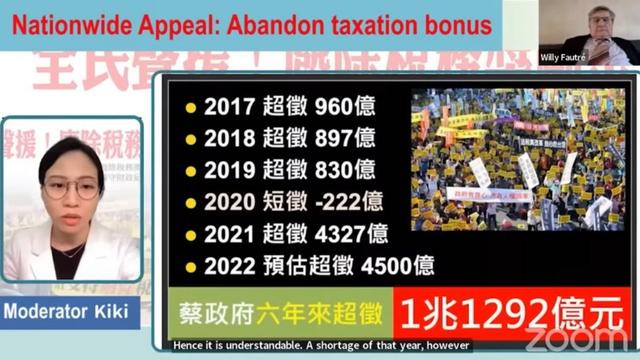January 11 was Taiwan’s Judicial Day. Participants in an international webinar expressed the hope it would be an opportunity to reflect on what went wrong in the Tai Ji Men case.
by Daniela Bovolenta

On January 11, 2023, CESNUR and Human Rights Without Frontiers co-organized one of their bi-monthly webinars on the Tai Ji Men case, on “Real, Independent Justice for Tai Ji Men.” January 11 was Taiwan’s Judicial Day, commemorating the date of January 11, 1943, when the Republic of China entered into a new treaty with the United States and the United Kingdom, making its judicial system independent from any foreign jurisdiction.
Iván Arjona Pelado, president of the ECOSOC-accredited Madrid-based NGO Fundación para la Mejora de la Vida, la Cultura y la Sociedad, introduced the webinar and a video on the anniversary of the beginning of the Tai Ji Men case on December 19, 1996, which in 2023 will have its 27th anniversary. The video is called “Love,” as a song with the same title that has been sung for several decades in Chinese and English, and the corresponding testimonies, express the love of Tai Ji Men dizi (disciples) towards those who suffered throughout years of persecution, injustice, and protest. Arjona commented that love for the common good and one’s fellow citizens is the engine making legal systems work. Love and conscience seem to have been forgotten in the Tai Ji Men case, Arjona said, which caused enormous and long-lasting injustices.
Arjona then introduced the first two speakers, Massimo Introvigne, sociologist and editor-in-chief of Bitter Winter, and Marco Respinti, an Italian journalist and scholar who is director-in-charge of the same magazine.
Introvigne celebrated Taiwan’s Judicial Day but noted that a healthy legal system, while it should be independent from any foreign control, should not be independent from morality and conscience. He offered the example of a popular character in Japanese history, Prince Shotoku, who served as Regent of Japan from 593 to 622 CE.
The full video of the webinar.
Shotoku, Introvigne said, affirmed the national identity of Japan but at the same time, in famous texts attributed to him, insisted that laws and their enforcement should not be independent from honesty and conscience. This example, Introvigne concluded, is important for Taiwan, where the connection between law and conscience obviously failed in the Tai Ji Men case.
Marco Respinti noted that in 1985 the United Nations organized the Seventh Congress on the Prevention of Crime and the Treatment of Offenders in the city where he works, Milan, Italy. On the final day, a text was adopted called “Basic Principles on the Independence of the Judiciary.”
Independence of judges and prosecutors from any foreign or domestic control is a key principle of democracy, Respinti said, but an additional element is needed. Prosecutor and judges should also be independent from personal interests and corruption. It is this latter independence, he concluded, that was lacking in the Tai Ji Men case.
Willy Fautré, co-founder and director of Human Rights Without Frontiers, introduced a video with an appeal to return to citizens, as other countries do, Taiwan’s excessive tax revenues, revoke illegal tax bills, and eliminate a major incentive to corruption of tax officers: the bonus system, under which Taiwanese bureaucrats are rewarded when they impose tax bills, be they well-founded or not.

Fautré connected Taiwan’s Judicial Day with the recently celebrated anniversary of the murder of the Archbishop of Canterbury, and former Lord Chancellor of the United Kingdom, Thomas Becket. He was killed on December 29, 1170, by hitmen of Henry II of England because he had told him he would rather follow his conscience than the king’s unjust laws and orders. Becket was a witness for conscience, Fautré said, just as Tai Ji Men dizi are witnesses for conscience today.
Fautré then introduced the testimonies of five dizi of Tai Ji Men. Yoyo Huang, who works as a manager in an electronic company, reviewed the main violations of law that happened during the Tai Ji Men case. She said that in a democratic society the judicial system should be justice’s last line of defense. While Tai Ji Men dizi are grateful to judges in Taiwan who acquitted their Shifu (Grand Master), Dr. Hong Tao-Tze, and his co-defendants of all charges, including tax evasion, Huang noted that in general Taiwan’s judicial system is still too much controlled by the executive power. This is particularly true in tax cases, she said, quoting Professor Wu Jing-Chin, from Aletheia University’s Law School, who called the Tai Ji Men case “a demon mirror of Taiwan’s tax law.”
Clement Kuo, a semiconductor engineer, emphasized the problem with the administration of law in Taiwan, where citizens jokingly use the expression “dinosaur judges” to indicate that they follow outdated models, which may ultimately result in denial of justice. The Tai Ji Men case, Kuo said, may be divided into two phases, the criminal case and the tax case. Tai Ji Men ultimately obtained a full victory in the criminal case, although the prosecutor who had breached the law was never punished. The tax case is still going on. It should have been solved after the end of the criminal case, but wasn’t. Because the injustices of the Tai Ji Men tax case and other similar cases have not been rectified, Kuo explained, citizens cannot fully rely on Taiwan’s justice system.

Chang Chun-Ya, a hospital operating room clerk, recalled her experience when she attended with Dr. Hong the 2018 19th International Conference of Chief Justices of the World in Lucknow, India. There, the President of Trinidad & Tobago donated to her and other dizi bracelets with an inscription, “Do the right thing; do things right.” This simple message, she said, should be at the heart of Judicial Day, as the laws and the judiciary should be at the service of rightfulness. Obviously, Chang noted, the opposite occurred in Taiwan with the Tai Ji Men case. As a young person, Chang said she would like to appeal to the President of Taiwan to “do the right thing, do things right” in restoring justice to Tai Ji Men.
Chen Dong-Rong (Tony), an artist, noted that Taiwanese citizens do not trust the judiciary and frequently tell jokes on its lack of independence from the executive power. Things do not seem to have changed since 1996, Chen said, when he was personally a victim of the Tai Ji Men case. On December 19, 1996, he happened to be in the Miaoli Tai Ji Men Academy, from where he was taken to the Miaoli Investigation Bureau, where he was asked questions (including “Have you been cheated?”) clearly indicating what kind of answers the investigators expected to receive. Eventually, Tai Ji Men was cleared of all accusations by Taiwan’s courts of law, including the Supreme Court, but the tax case is still going on, Chen concluded, evidencing that areas remain where the judiciary is either not totally independent or not effective.

A view of the webinar.
Irene Tang, a college student, mentioned that she attended in 2019 the 20th International Conference of Chief Justices of the World in India (as mentioned earlier, another speaker, Chang Chun-Ya, attended the 19th edition of this event in 2018). She realized how Dr. Hong is held in high regard by leading political and judicial authorities throughout the world. All this good work, Tang said, offers a dramatic contrast with the persecution of Tai Ji Men, which continues today by exploiting “the dark site of tax law” and offers an image of the precarious state of religious liberty in Taiwan.
Alessandro Amicarelli, a London-based human rights attorney and the president of the European Federation for Freedom of Belief (FOB) offered the conclusions of the webinar. Amicarelli celebrated the long battle of Tai Ji Men for justice and peace, and the role of Dr Hong in inspiring this fight. On Judicial Day, Amicarelli said, it is fit to remember that Tai Ji Men dizi do not fight for themselves only but for all Taiwanese citizens and their dream of achieving a real democracy. He quoted Catholic scholar and Dominican priest Hilary J. Carpenter on the interdependence of conscience and justice. While they are different, they can never be totally separated, just as they cannot be totally separated from love. Their separation in the Tai Ji Men case led to the injustice and persecution we have witnessed for 27 years. It is now time, Amicarelli concluded by quoting a famous song by Michael Jackson, to “heal the world.”

The event concluded with a video promoting Dr. Hong’s and Tai Ji Men’s proposal for a World Prayer Day to be celebrated on October 16, an initiative Bitter Winter supports, and featuring the grandiose ceremonies of October 16, 2022 in Taipei.
Source: Bitter Winter

